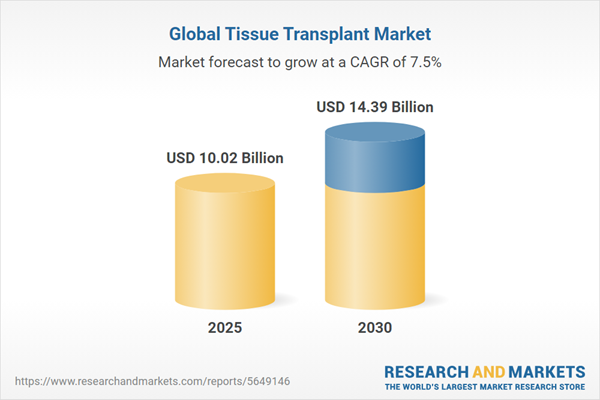The global tissue transplant market is experiencing significant growth driven by the increasing prevalence of chronic diseases, rising health awareness, and technological advancements. Tissue transplants, or grafts, involve transferring tissue from one location to another within the same or different individuals to restore functionality in cases of severe organ or tissue damage caused by conditions such as diabetes, cancer, cardiovascular disease, renal disease, and Alzheimer’s disease. These chronic conditions often lead to irreversible tissue damage, making transplantation a critical solution for restoring a healthy life.
Market Drivers
Rising Chronic Diseases and Injury Cases
The surge in chronic diseases has heightened the risk of permanent tissue damage, increasing the demand for tissue transplants. Commonly performed procedures include transplants of skin, cornea, bones, heart valves, tendons, nerves, and veins. The market is further propelled by a growing number of burn and injury cases. For instance, a 2023 European Road Safety Observatory study reported 102,362 injury accidents in Spain, underscoring the need for tissue transplantation to address such injuries.Skin Transplantation
The skin transplant segment is anticipated to hold a significant market share due to the rising incidence of burns, acid injuries, and conditions like skin cancer and diabetes. Skin grafting involves harvesting a small patch of skin from one part of a patient’s body and transplanting it to the damaged area, effectively treating extensive injuries. This segment’s growth is driven by the increasing prevalence of these conditions globally.Allograft Segment Growth
The allograft segment, involving the transplantation of tissue or organs between non-identical individuals of the same species, is projected to grow at a significant compound annual growth rate (CAGR). Improved patient outcomes from allograft products and strategic expansions by market players are key drivers. While no specific post-2023 examples are available, the focus on expanding allograft product offerings continues to support this segment’s growth.Technological Advancements
Advancements in transplant technologies are expected to fuel market expansion by improving procedure outcomes and accessibility. These innovations create opportunities for enhanced treatment efficacy and broader adoption of tissue transplantation.Market Challenges
Despite its growth potential, the tissue transplant market faces challenges, including transplant rejection, which remains a significant barrier to widespread adoption. Additionally, limited awareness about tissue transplantation in certain regions restricts market expansion.Geographical Outlook
North America is expected to dominate the tissue transplant market due to its advanced healthcare infrastructure and the presence of key industry players. Europe follows as the second-largest market, driven by substantial investments in research and development and a large patient population. These factors are anticipated to sustain regional growth over the forecast period.The tissue transplant market is poised for growth, driven by rising chronic disease prevalence, technological advancements, and increasing injury-related demand. However, challenges like transplant rejection and awareness gaps must be addressed to fully realize the market’s potential. North America and Europe are expected to lead, supported by robust healthcare systems and ongoing innovation.
Key Benefits of this Report:
- Insightful Analysis: Gain detailed market insights covering major as well as emerging geographical regions, focusing on customer segments, government policies and socio-economic factors, consumer preferences, industry verticals, and other sub-segments.
- Competitive Landscape: Understand the strategic maneuvers employed by key players globally to understand possible market penetration with the correct strategy.
- Market Drivers & Future Trends: Explore the dynamic factors and pivotal market trends and how they will shape future market developments.
- Actionable Recommendations: Utilize the insights to exercise strategic decisions to uncover new business streams and revenues in a dynamic environment.
- Caters to a Wide Audience: Beneficial and cost-effective for startups, research institutions, consultants, SMEs, and large enterprises.
What do businesses use our reports for?
Industry and Market Insights, Opportunity Assessment, Product Demand Forecasting, Market Entry Strategy, Geographical Expansion, Capital Investment Decisions, Regulatory Framework & Implications, New Product Development, Competitive IntelligenceReport Coverage:
- Historical data from 2022 to 2024 & forecast data from 2025 to 2030
- Growth Opportunities, Challenges, Supply Chain Outlook, Regulatory Framework, and Trend Analysis
- Competitive Positioning, Strategies, and Market Share Analysis
- Revenue Growth and Forecast Assessment of segments and regions including countries
- Company Profiling (Strategies, Products, Financial Information, and Key Developments among others).
Global Tissue Transplant Market Segmentation
By Tissue Type
- Cornea
- Skin
- Bone Marrow
- Others
By Graft Type
- Autograft
- Allograft
- Xenograft
By End-User
- Hospitals
- Surgical Centers
- Others
By Geography
- North America
- USA
- Canada
- Mexico
- South America
- Brazil
- Argentina
- Others
- Europe
- United Kingdom
- Germany
- France
- Italy
- Others
- Middle East and Africa
- Saudi Arabia
- UAE
- Israel
- Others
- Asia Pacific
- China
- Japan
- India
- South Korea
- Indonesia
- Thailand
- Taiwan
- Others
Table of Contents
Companies Mentioned
- Pinnacle Transplant Technologies, Inc.
- CryoLife, Inc (Artivion Inc)
- RTI Surgical Holdings, Inc.
- CBR Systems, Inc.
- Zimmer Biomet
- XVIVO
- Arthrex, Inc.
- Stryker Corporation
- Medtronic PLC
Table Information
| Report Attribute | Details |
|---|---|
| No. of Pages | 148 |
| Published | June 2025 |
| Forecast Period | 2025 - 2030 |
| Estimated Market Value ( USD | $ 10.02 Billion |
| Forecasted Market Value ( USD | $ 14.39 Billion |
| Compound Annual Growth Rate | 7.5% |
| Regions Covered | Global |
| No. of Companies Mentioned | 9 |









